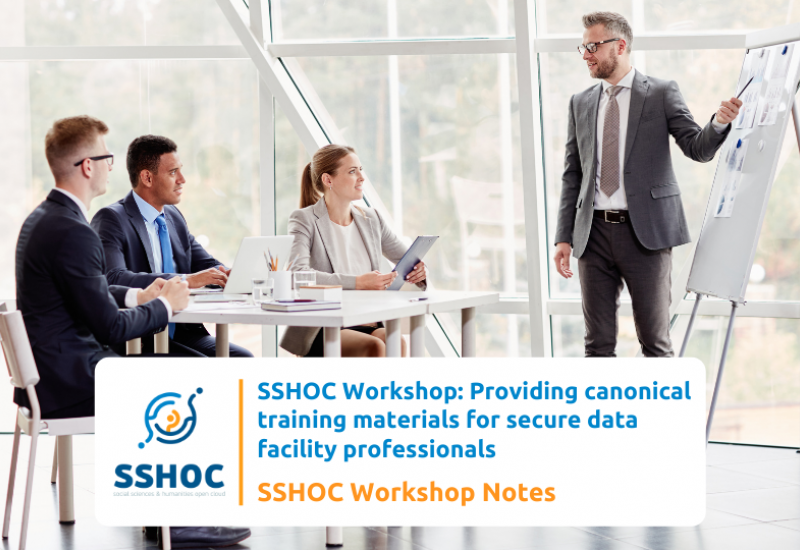
- Social Sciences & Humanities Open Cloud
SSHOC Workshop Notes: Providing canonical training materials for secure data facility professionals

Date:
30 September 2021
Using Secure Access Data Safely: Developing canonical training materials
The Social sciences and Humanities provide researcher infrastructure that allows the sharing of confidential, sensitive data for research. A key part of keeping these data safe is to employ mandatory training for researchers in data protection and the safe use of research data.
More than 30 data professionals from around the world joined the SSHOC & GESIS Online Workshop on September 21st. It provided a perfect opportunity to present and discuss a new set of canonical training slides aimed at helping secure data access facilities to develop training courses in the safe use of secure access data.
Why training is important
Providing access to very detailed secure microdata is not new, there are secure data access facilities around the world facilitating data access, many of whom have been established for many years. Where data access is via a physical data enclave or Safe Room, a lot of physical controls are in place to ensure researchers use data safely. But with the move towards virtual data enclaves or Remote Access or Remote Desktop systems, we lose some of those physical controls. So we must replace them with other safeguards, such as training. Through training we aim to make sure researchers know how to use secure data safely.
Developing training is resource intensive so we hope that these canonical training materials will assist secure data services to provide standardised, high quality for researchers. As we move towards remote access connections that allow access across services and even across international borders, having some commonalities in the training offered will allow secure data services confidence that researchers know the principles of keeping data safe regardless of where they trained.
A set of canonical set of materials, consisting of a PowerPoint presentation and a supplementary guide for trainers have been developed by Deborah Wiltshire (GESIS, Secure Data Centre), which builds on the wealth of expertise among UK secure data access services and her experience over many years of training researchers in the UK.
These materials are not designed to be a finished product but to provide a framework of core content on which to build a safe researcher type training course. The aim is that any secure data access facility can use the canonical materials as a basis for building their safe researcher training course tailored to meet the specific needs of their service.
Getting to know the training materials
The first part of the workshop was focused on explaining the motivation behind the development of the training materials and how they are intended to be used by secure data access facilities.
Deborah Wiltshire (GESIS) introduced the training materials which are arranged into six modules, providing a clear structure and easy adaptability.
- Module 1 - Introduction
- Module 2 - Understanding what impacts data access
- Module 3 - The role of legislation in data access
- Module 4 - The 5 Safes framework
- Module 5 – Statistical Disclosure Control
- Module 6 – Service specific protocols
Getting feedback on the materials
The second part of the workshop was dedicated to the feedback session. The participants were put into small groups of around 4-5 and asked to discuss the materials, focusing on whether they thought the materials were clear and comprehensive, what they thought worked well and what topics, if any, they thought were missing.
The participants came from many different backgrounds, some were highly experienced secure data access professionals, some researchers, and others came just out of curiosity. All participants were very open to learning about the materials and this made for very lively, engaged conversations. Each group noted some key points from their discussion which will feed into the post-workshop report and will steer the future development of the training materials.
Want to know more?
Many additional useful insights were shared throughout the workshop, so we invite you to watch the recording and view the presentation slides on the main event page.
Event Page
We welcome any feedback on the training materials and if you are interested in discussing these materials further, please contact Deborah (Deborah.wiltshire@gesis.org).
